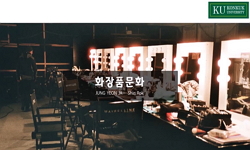These days, the cosmetics industry faces fierce competition to survive in line with the era of global information. In this circumstance, it is very important for cosmetic companies to understand consumers’ decision-making behavior. In the way of exp...
http://chineseinput.net/에서 pinyin(병음)방식으로 중국어를 변환할 수 있습니다.
변환된 중국어를 복사하여 사용하시면 됩니다.
- 中文 을 입력하시려면 zhongwen을 입력하시고 space를누르시면됩니다.
- 北京 을 입력하시려면 beijing을 입력하시고 space를 누르시면 됩니다.
소비자 의사결정유형이 화장품 소비가치와 광고수용태도에 미치는 영향 = The Effects of Consumer Decision Types on the Consumption Value and Advertising Acceptance Behavior of Cosmetics
한글로보기https://www.riss.kr/link?id=T15542958
- 저자
-
발행사항
서울 : 서경대학교 미용예술대학원, 2020
-
학위논문사항
학위논문(석사) -- 서경대학교 미용예술대학원 , 미용예술학과 피부미용 , 2020. 2
-
발행연도
2020
-
작성언어
한국어
- 주제어
-
DDC
658.8342 판사항(23)
-
발행국(도시)
서울
-
형태사항
1책 ; 26 cm
-
일반주기명
지도교수: 이인희
-
UCI식별코드
I804:11015-200000279121
- 소장기관
-
0
상세조회 -
0
다운로드
부가정보
다국어 초록 (Multilingual Abstract)
These days, the cosmetics industry faces fierce competition to survive in line with the era of global information. In this circumstance, it is very important for cosmetic companies to understand consumers’ decision-making behavior. In the way of experiencing dramatically increased advertisements in their everyday life, consumers can have positive or negative feelings.
Types of consumers are diversified, and therefore, the mindshare to captivate consumers’ heart becomes a critical marketing strategy of companies, recently. In addition, consumers have been more interested in the eco-friendly value of cosmetics, rather than their physical value, and they began to lay stress on the social value. To maximize profits through effective marketing, many enterprises focus on finding consumers’ needs or establishing the relationship with them.
Therefore, the purpose of this study is to find the most influential factor when consumers make a decision, to define the influence of decision-making types on cosmetics consumption values and advertising acceptance attitudes, and to provide a fundamental material for the development of the cosmetics advertising industry.
In order to analyze the influence of consumers’ decision-making types on cosmetics consumption values and advertising acceptance attitudes, this researcher had conducted a questionnaire survey with a total of 420 women in their 20s to 50s living in Seoul and Metropolitan areas, from Mar. 3 to Mar. 30, 2019. The analysis results are presented as follows:
Firstly, with regard to the influence of consumers’ decision-making types on cosmetics consumption values, the more there were prudent and intuitive factors among the sub factors of the types, the more social, emotional, and functional values (which are sub factors of consumption values) in order were largely influenced.
Secondly, with regard to the influence of consumers’ decision-making types on advertising acceptance attitudes, the more there were prudent and intuitive factors among the sub factors of the types, the more good intention of advertising, purchase stimulus, information trust, and negative recognition (which are sub factors of advertising acceptance attitudes) were greatly influenced.
Thirdly, with regard to the influence of cosmetics consumption values on advertising acceptance attitudes, the more there was emotional value among the sub factors of cosmetics consumption values, the more good intention of advertising, purchase stimulus, information trust, and negative recognition (which are sub factors of advertising acceptance attitudes) were greatly influenced.
As such, it was found that consumers’ decision-making types were a significant factor influencing cosmetics consumption values and advertising acceptance attitudes positively. To develop the cosmetics industry, it will be necessary to induce and manage consumers through systematic and differentiated advertising in consideration of the characteristics of consumers’ decision-making types. It will be helpful to promote consumers’ purchase through the best service recognized by consumers, and to become a fundamental material of the marketing strategy for competitive cosmetics.
In this study, the influence of consumers’ decision-making types on cosmetics consumption values and advertising acceptance attitudes was analyzed in order to find consumers’ psychology or needs. However, there was lack of direct research on consumption values and advertising acceptance attitudes. The subjects of this study were adult women so that it was hard to extract samples. If the relation and influence of external variables like communication is researched, it will be meaningful.
국문 초록 (Abstract)
최근 화장품 산업은 글로벌 정보화 시대에 맞춰 생존을 위한 치열한 경쟁을 하고 있으며 이러한 환경에서 소비자들의 의사결정 행동을 이해하고 파악하는 것은 화장품 기업에서는 매우 중...
최근 화장품 산업은 글로벌 정보화 시대에 맞춰 생존을 위한 치열한 경쟁을 하고 있으며 이러한 환경에서 소비자들의 의사결정 행동을 이해하고 파악하는 것은 화장품 기업에서는 매우 중요하다. 소비자들은 일상생활에서 광고의 극적인 증가를 경험하면서 긍정적 또는 부정적 감정이 유발될 수 있다. 그로 인하여 소비자 유형은 다양화되고 소비자의 마음을 사로잡는 마인드 셰어가 최근 기업의 중요한 마케팅 전략이 되었다. 또한 화장품에 대한 물질적 가치보다 친환경에 관심이 높아진 소비자들은 사회적 가치도 중시하기 시작하였으며 많은 기업은 효과적인 마케팅 활동으로 이윤을 극대화하기 위해 소비자의 욕구 파악이나 관계 구축을 위한 활동에 역점을 두고 있다.
이에 본 연구는 소비자들이 의사결정을 할 때 어떠한 요인에 가장 영향력이 있는지 파악하여, 의사결정유형이 화장품 소비가치, 광고수용태도에 미치는 영향을 규명함으로써 화장품 광고 산업 발전에 필요한 기초 자료로 제공되고자 한다.
본 연구에서는 소비자 의사결정유형이 화장품 소비가치, 광고수용태도에 미치는 영향을 분석하기 위하여 2019년 3월 6일부터 3월 30일까지 24일간 서울 및 수도권 지역의 20대-50대 성인여성을 대상으로 총 420부 설문조사를 실시하였으며 연구결과는 다음과 같다.
첫째, 소비자 의사결정유형이 화장품 소비가치에 미치는 영향에서는 소비자 의사결정유형의 하위요인 중 신중한, 직관적 유형의 요인들이 높을수록 소비가치의 하위요인인 사회적, 감정적, 기능적 가치 순으로 큰 영향을 미치는 것으로 나타났다.
둘째, 소비자 의사결정유형이 광고수용태도에 미치는 영향에서는 소비자 의사결정유형의 하위요인 중 신중한, 직관적 유형의 요인들이 높을수록 광고수용태도의 하위요인인 광고호의, 구매자극, 정보신뢰, 부정적인지에 큰 영향을 미치는 것으로 나타났다.
셋째, 화장품 소비가치가 광고수용태도에 미치는 영향에서는 화장품 소비가치의 하위요인 중 감정적 가치의 요인이 높을수록 광고수용태도의 하위요인인 광고호의, 구매자극, 정보신뢰, 부정적인지에 큰 영향을 미치는 것으로 나타났다.
이처럼 소비자 의사결정유형이 화장품 소비가치와 광고수용태도에 긍정적인 영향을 미치는 중요한 요인임을 알 수 있으며, 앞으로 화장품 산업 발전을 위해서는 소비자 의사결정유형의 특성을 고려한 체계적이고 차별화 된 광고로 소비자를 관리하고 유도해야 할 것이다. 이는 소비자들이 인식하는 최상의 서비스로 구매촉진에 도움이 될 것이며 경쟁력 있는 화장품 마케팅 전략의 기초 자료가 될 것으로 사료된다.
본 연구에서는 소비자 의사결정유형이 화장품 소비가치와 광고수용태도에 미치는 영향을 파악하여 소비자들의 심리나 욕구를 알아보는 것으로 소비가치와 광고수용태도의 직접적인 연구는 부족한 상황이다. 또한 성인여성을 대상으로 연구하였기에 표본으로 추출하기는 어려웠으며 향후 후속 연구에서는 커뮤니케이션 등의 외적변수들과의 관계와 영향에 대한 연구도 의미가 있을 것으로 사료된다.
목차 (Table of Contents)
- 국문초록 i
- 제1장 서론 1
- 1. 연구의 필요성 및 목적 1
- 제2장 이론적 배경 5
- 1. 의사결정유형 5
- 국문초록 i
- 제1장 서론 1
- 1. 연구의 필요성 및 목적 1
- 제2장 이론적 배경 5
- 1. 의사결정유형 5
- 2. 화장품 소비가치 10
- 3. 광고수용태도 14
- 제3장 연구방법 19
- 1. 연구모형 및 연구문제 19
- 1) 연구모형 19
- 2) 연구문제 20
- 2. 연구대상 및 연구절차 21
- 3. 연구도구 및 내용 22
- 1) 인구통계학적 특성 22
- 2) 의사결정유형 22
- 3) 화장품 소비가치 22
- 4) 광고수용태도 23
- 4. 자료처리 및 분석방법 25
- 제4장 연구결과 26
- 1. 조사대상자의 인구통계학적 특성 26
- 2. 측정도구의 타당성 및 신뢰도 검증 28
- 1) 의사결정유형에 대한 타당성 및 신뢰도 검증 29
- 2) 화장품 소비가치에 대한 타당성 및 신뢰도 검증 31
- 3) 광고수용태도에 대한 타당성 및 신뢰도 검증 33
- 3. 기술통계적 분석 35
- 1) 의사결정유형 35
- 2) 화장품 소비가치 38
- 3) 광고수용태도 41
- 4. 소비자 의사결정유형과 화장품 소비가치, 광고수용태도의 상관관계분석 44
- 5. 소비자 의사결정유형이 화장품 소비가치에 미치는 영향 48
- 1) 소비자 의사결정유형이 기능적 가치에 미치는 영향 48
- 2) 소비자 의사결정유형이 경제적 가치에 미치는 영향 50
- 3) 소비자 의사결정유형이 사회적 가치에 미치는 영향 52
- 4) 소비자 의사결정유형이 상황적 가치에 미치는 영향 54
- 5) 소비자 의사결정유형이 진귀적 가치에 미치는 영향 56
- 6) 소비자 의사결정유형이 감정적 가치에 미치는 영향 58
- 6. 소비자 의사결정유형이 광고수용태도에 미치는 영향 60
- 1) 소비자 의사결정유형이 광고호의에 미치는 영향 60
- 2) 소비자 의사결정유형이 구매자극에 미치는 영향 62
- 3) 소비자 의사결정유형이 정보신뢰에 미치는 영향 64
- 4) 소비자 의사결정유형이 부정적인지에 미치는 영향 66
- 7. 화장품 소비가치가 광고수용태도에 미치는 영향 68
- 1) 화장품 소비가치가 광고호의에 미치는 영향 68
- 2) 화장품 소비가치가 구매자극에 미치는 영향 70
- 3) 화장품 소비가치가 정보신뢰에 미치는 영향 72
- 4) 화장품 소비가치가 부정적인지에 미치는 영향 74
- 제5장 결론 76
- 참고문헌 80
- 부록 90
- ABSTRACT 96












